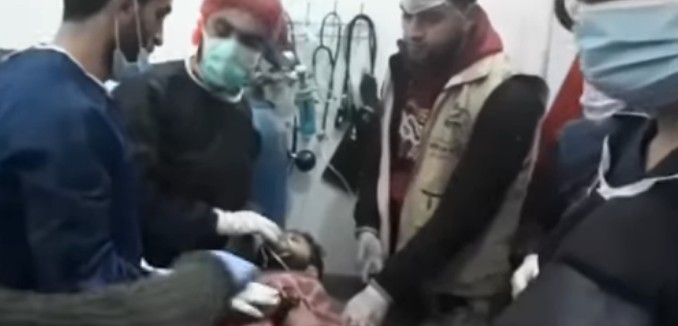The United Nations reported Wednesday that the Assad regime in Syria continues to use chemical weapons against civilian targets, including three chlorine gas attacks on a rebel-held Damascus suburb and on Idlib province this year that constitute war crimes, The Jerusalem Post reported.
The latest evidence brings to 39 the total number of chemical attacks registered by the Commission of Inquiry on Syria since 2013. The perpetrators behind six of the attacks could not sufficiently be identified, while 33 atrocities were conclusively attributed to the Syrian regime.
“To recapture eastern Ghouta in April, government forces launched numerous indiscriminate attacks in densely populated civilian areas, which included the use of chemical weapons,” the U.N. report said, referring to incidents on Jan. 22 and Feb. 1 in a residential area of Douma, eastern Ghouta, outside the capital.
“The Commission concludes that, on these two occasions, government forces and or affiliated militias committed the war crimes of using prohibited weapons and launching indiscriminate attacks in civilian-populated areas in eastern Ghouta,” U.N. officials added.
Weaponized chlorine is considered a chemical weapon and its use is banned under the Chemical Weapons Convention, ratified by Syria, and under international law.
In the northwest province of Idlib – where the regime and Russian forces are gearing up for an all-out assault on the last rebel stronghold – chlorine was also used on February 4, the U.N. report said.
“Government helicopters dropped at least two barrels carrying chlorine payloads in the Taleel area of Saraqeb,” it charged, adding that at least 11 men were injured. ” Evidence analyzed by the Commission confirmed the presence of helicopters in the area and the use of two yellow gas cylinders.
U.S. Defense Secretary Jim Mattis said Tuesday that the Syrian regime has been warned against any chemical weapons use in an anticipated assault on Idlib province. “In Idlib, we’re watching very closely what the Assad regime, aided and abetted by the Iranians and the Russians are up to there,” Mattis told Pentagon reporters.
In recent years, the Assad regime has frequently employed banned chemical weapons against civilian targets. Following the attack in Ghouta, the regime and its ally, Russia, were accused of attempting to cover up the use of chemical weapons. Inspectors from the Organization for the Prevention of Chemical Weapons (OPCW) were not given access to the site for two weeks.
The New York Times reported that details omitted from a UN report in June implicated both Iran and Syria for the use of chemical weapons in Ghouta.
[Photo: euronews (in English) / YouTube ]




